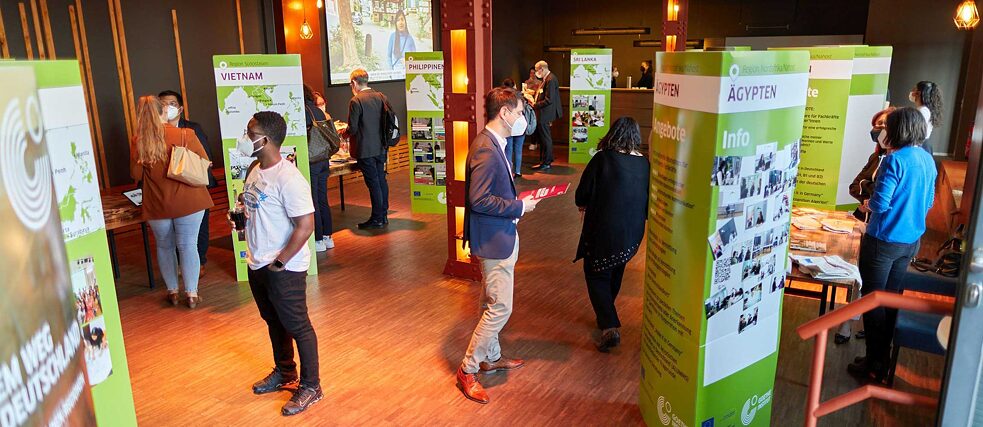Building bridges together

The Goethe-Institut has always supported people during their migration to Germany. What form does this support take? What works well? What else needs to be done? These were the focuses of an event entitled “Discover. Explore. Arrive. Outcomes of preparatory and early integration projects run by the Goethe-Institut, and immigration potential for qualified professionals”.
People from all over the world are taking the plunge and travelling abroad to gather new experiences and find new perspectives in their career. The German economy, on the other hand, is crying out for qualified professionals. The German government is trying to bring the two together. And institutions like the Goethe-Institut contribute significantly here. An event held in Berlin on 11th and 12th May 2022 entitled “Discover. Explore. Arrive. Outcomes of preparatory and early integration projects run by the Goethe-Institut, and immigration potential for qualified professionals.” looked at how successful this approach is, and the challenges it entails.
(Pre-) integration – the opportunities and challenges involved
How can we successfully prepare foreign workers in German firms and in German society so that their arrival in Germany is a positive experience and they settle there on a long-term basis? What knowledge of local culture do candidates need and how well must they speak German to feel at home here, and to be employable in jobs such as nurse or engineer in a company? How can the German economy be a strong contender in the international competition for qualified professionals? These are just a few of the questions that were discussed.One thing has become clear: the covid pandemic and current war in Ukraine are affecting the migration of skilled professionals as well. Michael Kellner from the German Ministry for Economic Affairs and Climate Protection announced that visas would be awarded more quickly to qualified workers and their families: “There was a huge consensus between the three governing parties in the coalition negotiations that something had to happen in that respect. I think that we will see radical reform in our country by 2023.” And Dr Martin Wansleben from the German Chamber of Industry and Commerce said: “We need skilled workers from abroad, probably three or four hundred thousand of them. We need fitters, roofers, builders. And we need to try pretty hard to get these workers.”
Accompanying people: from their old home to the new one
Additional discussion sessions provided a platform for further opinions, including representatives from Germany’s integration community, information centres and migrant organisations, as well as researchers. The central focus of the event was the work of the Goethe-Institut, with its Vorintegration (Pre-integration) and Ankommen in Deutschland (Arriving in Germany) projects, which are jointly funded by the Asylum, Migration and Integration Fund of the European Union and are due to finish this year. With diverse pre-integration services offered free of charge – ranging from personal advice to intercultural skills training – Goethe-Institutes around the world are catering for individuals who hope to migrate to Germany. Project team members from overseas were available to talk about their work at an exhibition within the event. Katharina Karpa coordinates the pre-integration project in Cairo and reports: “The exhibition visitors were very interested in the services we offer and engaged in conversation with us. We had the opportunity to tell them about our day-to-day work at local level, as well as exploring networking opportunities with potential cooperation partners.”Furthermore, migrants can access the Mein Weg nach Deutschland website – a core element of the Ankommen in Deutschland project – from their home country but also from within Germany, and especially during their transition period. As well as this, the Goethe-Institut has set up “Infohäuser” (Info houses) in various rural areas in Germany to allow immigrants access to additional resources with specific local relevance, including non-digital content. Representatives from those communities discussed the importance of the Infohäuser. An Infohaus was set up at the exhibition venue so that visitors could explore the services on offer for themselves.
Input from experts and immigrants
Social scientist Wolfgang Bosswick presented an evaluation of the pre-integration programme, and one aspect he praised was how the overseas project colleagues coped as a team with the challenges posed by the pandemic, quickly coming up with digital content that whilst introducing barriers to a certain degree does achieve a greater reach, particularly in rural areas. Prof. Dr Naika Foroutan, head of the Department of Integration Research and Social Policy at the Humboldt University in Berlin, considered the outcomes of pre-integration work in relation to the situation of individuals with a migration history in Germany. The expert said that German society was not yet tackling discrimination and exclusion decisively enough – despite high immigrant numbers and every effort to practise a policy of diversity – and referred to a recent development: “In fact most of the migrants who are here come from the former Eastern Bloc countries. This will pose a great challenge in the years ahead. We predict that we will encounter a variety of new anti-Slav feelings, but also conflict within these groups.”To finish, migrants related first-hand experiences of their hopes and disappointments, but also of happy encounters and personal successes. David Aboudi from Cameroon for instance thought at first that the hundred euros he had brought with him to Germany would last him a long time – and he did manage somehow to fund his own studies in the end. Sinenhlanhla Buthelezi from South Africa still clearly remembers being yelled at in a German supermarket in the early days because she was too slow at the checkout – and now she feels at home in Germany. Sanja Kitic from Bosnia and Herzegovina was initially exploited by her German employer, and is now head of a residential area of a care home in Munich. All three tell their stories in a video blog series on the Mein Weg nach Deutschland web portal.